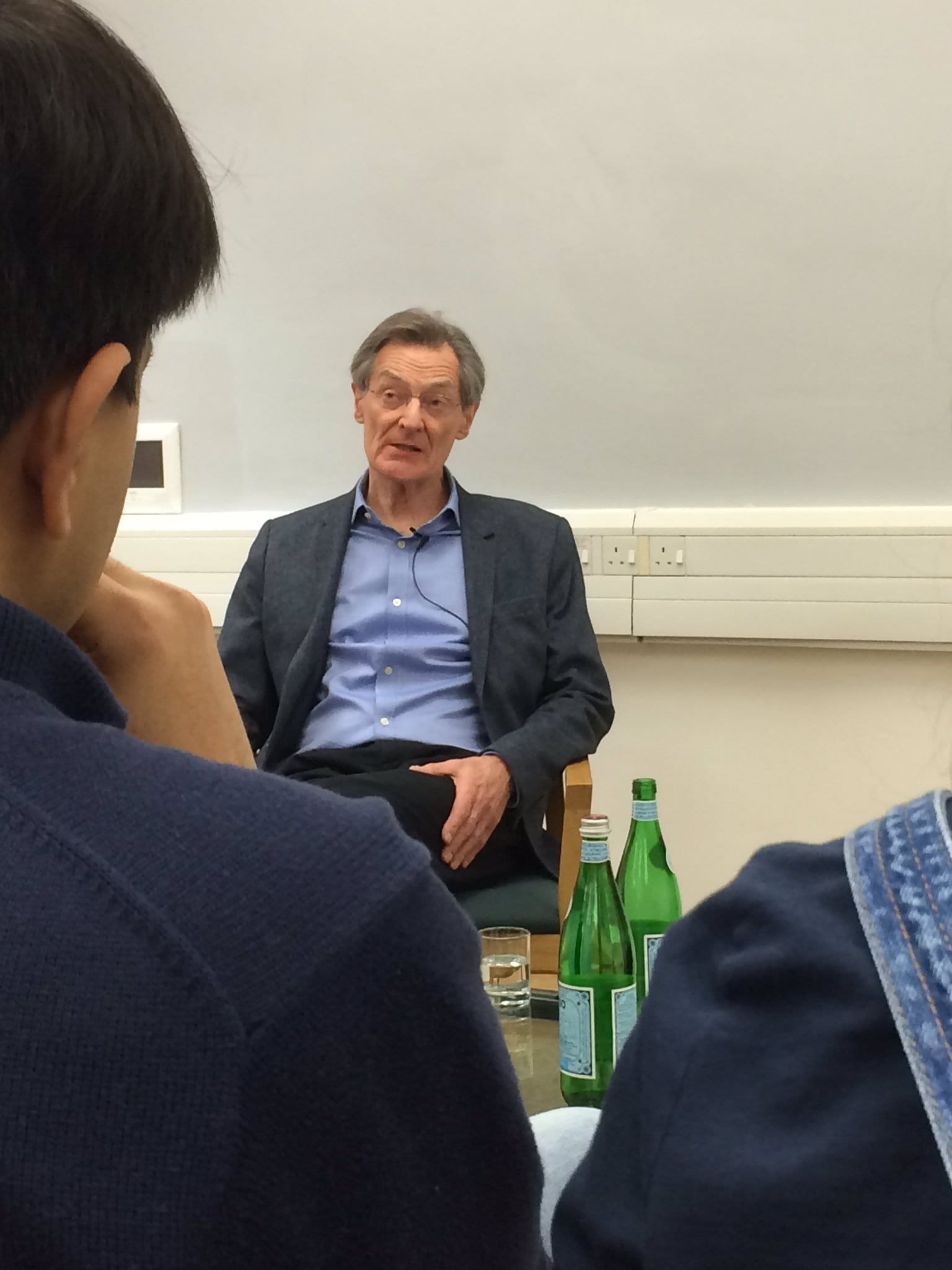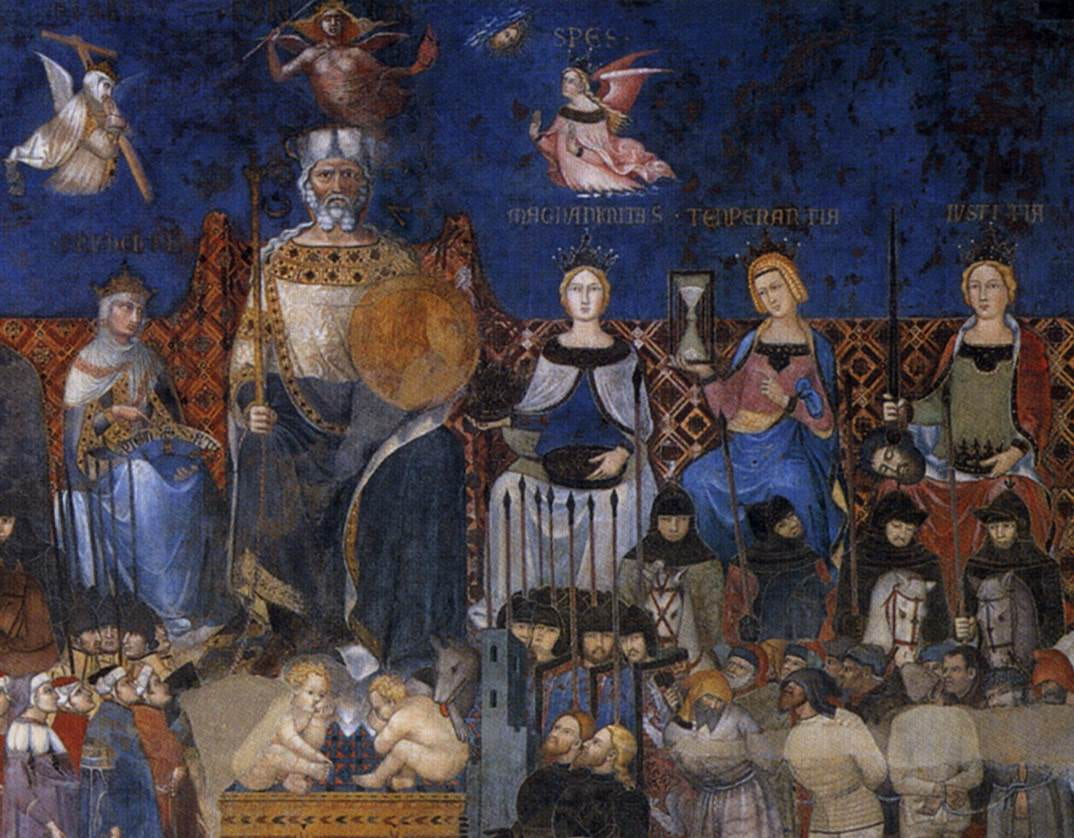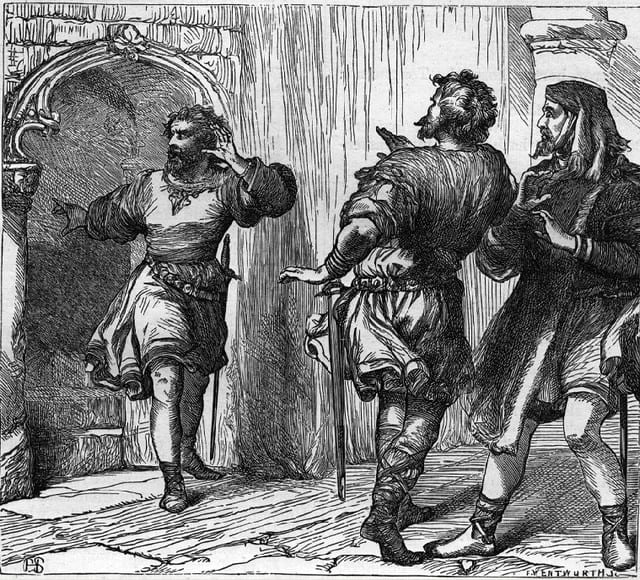by contributing editor Spencer J. Weinreich
Quentin Skinner is a name to conjure with. A founder of the Cambridge School of the history of political thought. Former Regius Professor of History at the University of Cambridge. The author of seminal studies of Machiavelli, Hobbes, and the full sweep of Western political philosophy. Editor of the Cambridge Texts in the History of Political Thought. Winner of the Balzan Prize, the Wolfson History Prize, the Sir Isaiah Berlin Prize, and many others. On February 24, Skinner visited Oxford for the Ertegun House Seminar in the Humanities, a thrice-yearly initiative of the Mica and Ahmet Ertegun Graduate Scholarship Programme. In conversation with Ertegun House Director Rhodri Lewis, Skinner expatiated on the craft of history, the meaning of liberty, trends within the humanities, his own life and work, and a dizzying range of other subjects.

Professor Quentin Skinner at Ertegun House, University of Oxford.
Names are, as it happens, a good place to start. As Skinner spoke, an immense and diverse crowd filled the room: Justinian and Peter Laslett, Thomas More and Confucius, Karl Marx and Aristotle. The effect was neither self-aggrandizing nor ostentatious, but a natural outworking of a mind steeped in the history of ideas in all its modes. The talk is available online here; accordingly, instead of summarizing Skinner’s remarks, I will offer a few thoughts on his approach to intellectual history as a discipline, the aspect of his talk which most spoke to me and which will hopefully be of interest to readers of this blog.
Lewis’s opening salvo was to ask Skinner to reflect on the changing work of the historian, both in his own career and in the profession more broadly. This parallel set the tone for the evening, as we followed the shifting terrain of modern scholarship through Skinner’s own journey, a sort of historiographical Everyman (hardly). He recalled his student days, when he was taught history as the exploits of Great Men, guided by the Whig assumptions of inevitable progress towards enlightenment and Anglicanism. In the course of this instruction, the pupil was given certain primary texts as “background”—More’s Utopia, Hobbes’s Leviathan, John Locke’s Two Treatises of Government—together with the proper interpretation: More was wrongheaded (in being a Catholic), Hobbes a villain (for siding with despotism), and Locke a hero (as the prophet of liberalism). Skinner mused that in one respect his entire career has been an attempt to find satisfactory answers to the questions of his early education.
Contrasting the Marxist and Annaliste dominance that prevailed when he began his career with today’s broad church, Skinner spoke of a shift “towards a great pluralism,” an ecumenical scholarship welcoming intellectual history alongside social history, material culture alongside statistics, paintings alongside geography. For his own part, a Skinner bibliography joins studies of the classics of political philosophy to articles on Ambrogio Lorenzetti’s The Allegory of Good and Bad Government and a book on William Shakespeare’s use of rhetoric. And this was not special pleading for his pet interests. Skinner described a warm rapport with Bruno Latour, despite a certain degree of mutual incomprehension and wariness of the extremes of Latour’s ideas. Even that academic Marmite, Michel Foucault, found immediate and warm welcome. Where many an established scholar I have known snorts in derision at “discourses” and “biopolitics,” Skinner heaped praise on the insight that we are “one tribe among many,” our morals and epistemologies a product of affiliation—and that the tribe and its language have changed and continue to change.

Detail from Ambrogio Lorenzetti’s “Allegory of the Good Government.”
My ears pricked up when, expounding this pluralism, Skinner distinguished between “intellectual history” and “the history of ideas”—and placed himself firmly within the former. Intellectual history, according to Skinner, is the history of intellection, of thought in all forms, media, and registers, while the history of ideas is circumscribed by the word “idea,” to a more formal and rigid interest in content. On this account, art history is intellectual history, but not necessarily the history of ideas, as not always concerned with particular ideas. Undergirding all this is a “fashionably broad understanding of the concept of the text”—a building, a mural, a song are all grist for the historian’s mill.
If we are to make a distinction between the history of ideas and intellectual history, or at least to explore the respective implications of the two, I wonder whether there is not a drawback to intellection as a linchpin, insofar as it emphasizes an intellect to do the intellection. To focus on the genesis of ideas is perhaps to the detriment of understanding how they travel and how they are received. Moreover, does this overly privilege intentionality, conscious intellection? A focus on the intellects doing the work is more susceptible, it seems to me, to the Great Ideas narrative, that progression from brilliant (white, elite, male) mind to brilliant (white, elite, male) mind.
At the risk of sounding like postmodernism at its most self-parodic, is there not a history of thought without thinkers? Ideas, convictions, prejudices, aspirations often seep into the intellectual water supply divorced from whatever brain first produced them. Does it make sense to study a proverb—or its contemporary avatar, a meme—as the formulation of a specific intellect? Even if we hold that there are no ideas absent a mind to think them, I posit that “intellection” describes only a fraction (and not the largest) of the life of an idea. Numberless ideas are imbibed, repeated, and acted upon without ever being much mused upon.
Skinner himself identified precisely this phenomenon at work in our modern concept of liberty. In contemporary parlance, the antonym of “liberty” is “coercion”: one is free when one is not constrained. But, historically speaking, the opposite of liberty has long been “dependence.” A person was unfree if they were in another’s power—no outright coercion need be involved. Skinner’s example was the “clever slave” in Roman comedies. Plautus’s Pseudolus, for instance, acts with considerable latitude: he comes and goes more or less at will, he often directs his master (rather than vice versa), he largely makes his own decisions, and all this without evident coercion. Yet he is not free, for he is always aware of the potential for punishment. A more nuanced concept along these lines would sharpen the edge of contemporary debates about “liberty”: faced with endemic surveillance, one may choose not to express oneself freely—not because one has been forced to do so, but out of that same awareness of potential consequences (echoes of Jeremy Bentham’s Panopticon here). Paradoxically, even as our concept of “liberty” is thus impoverished and unexamined, few words are more pervasive in present discourse.
Willey Reverly’s 1791 plan of the Panopticon.
On the other hand, intellects and intellection are crucial to the great gift of the Cambridge School: the reminder that political thought—and thought of any kind—is an activity, done by particular actors, in particular contexts, with particular languages (like the different lexicons of “liberty”). Historical actors are attempting to solve specific problems, but they are not necessarily asking our questions nor giving our answers, and both questions and answers are constantly in flux. This approach has been an antidote to Great Ideas, destroying any assumption that Ideas have a history transcending temporality. (Skinner acknowledged that art historians might justifiably protest that they knew this all along, invoking E. H. Gombrich.)
The respective domains of intellectual history and the history of ideas returned when one audience member asked about their relationship to cultural history. Cultural history for Skinner has a wider set of interests than intellectual history, especially as regards popular culture. Intellectual history, by contrast, is avowedly elitist in its subject matter. But, he quickly added, it is not at all straightforward to separate popular and elite culture. Theater, for instance, is both: Shakespeare is the quintessence of both elite art and of demotic entertainment.
On some level, this is incontestable. Even as Macbeth meditates on politics, justice, guilt, fate, and ambition, it is also gripping theater, filled with dramatic (sometimes gory) action and spiced with ribald jokes. Yet I query the utility, even the viability, of too clear a distinction between the two, either in history or in historians. Surely some of the elite audience members who appreciated the philosophical nuances also chuckled at the Porter’s monologue, or felt their hearts beat faster during the climactic battle? Equally, though they may not have drawn on the same vocabulary, we must imagine some of the “groundlings” came away from the theater musing on political violence or the obligations of the vassal. From Robert Scribner onwards, cultural historians have problematized any neat model of elite and popular cultures.

Frederick Wentworth’s illustration of the Porter scene in Macbeth.
In any investigation, we must of course be clear about our field of study, and no scholar need do everything. But trying to circumscribe subfields and subdisciplines by elite versus popular subjects, by ideas versus intellection versus culture, is, I think, to set up roadblocks in the path of that most welcome move “towards a great pluralism.”



April 6, 2017 at 1:59 am
Well, I believe that two of your claims are mutually exclusive: while you muse on the possibility of “a history of thought without thinkers”, you also praise the Cambridge School for remindig us that “that political thought is an activity, done by particular actors, in particular contexts, with particular languages”. You speak of white, elite, male thinkers in a quite derogatory way, seemingly attempting to diminish their significance in intellectual history, which is a phenomenon present in a large number of scholarly works these days. This is quite annoying, not as much because of its ideological implications, but because it is unscientific and excludes a large chunk of possible data. Striving for a “great pluralism” should involve the acknowledgement of the fact (a fact which I personally detest and am glad that it is no longer the case) that for much of the Early Modern/Modern period, the overwhelming majority of those seriously concerned with political theory, or any other scholarly activity for that matter, were white males who belonged to the elite of their societies. It is somber, but it is also a fact.
April 6, 2017 at 9:41 am
Dear Marton,
Thank you for your comment. It is true that I perhaps spoke more provocatively than precisely in mooting “a history of thought without thinkers.” More accurate might be, “a history of ideas without thought.” My praise of the Cambridge School is intended less for a focus on the individual actors, per se, than on their assertion that thought takes place in particular contexts. These are two claims that, though somewhat paradoxical, I don’t think are necessarily mutually exclusive: that a great deal of the history of thought takes place without much conscious intellection, and that all thought is historically situated and, yes, in the last analysis occurs within individuals.
As to the second critique, I would never suggest ignoring the work of elite white men—indeed, a great deal of my own scholarship concerns the thought and writings of just such people. It would absolutely be unscientific to exclude their work from our analysis. But, contrarily, to claim that the history of ideas, even in the premodern period, is entirely, or even primarily, the story of the thoughts of elite white men, is simply inaccurate. Whether in the form of such celebrated figures as Christine de Pizan, Guaman Poma de Ayala, and the myriad luminaries of the medieval and early modern Islamic world (Ibn Sina, al-Ghazali, and so on), brilliant interlocutors (and thinkers in their own right) like Harriet Taylor or Madame Helvetius, or the many thousands of lesser-known women, workers, and people of color whose efforts contributed, often in utterly essential ways (see the work of Simon Schaffer and Paola Bertucci, among many others), it is by no means a purely political point to insist on de-centering white elite men from our intellectual history. My critique is simply that to focus on the intellect doing the intellection, abstracted from the material realities and cultural contexts, allows us to ignore—unscientifically, to borrow your term—the vital contributions of, let us say, the artisans who built and operated the Royal Society’s air pump, or Maria Celeste, who helped in the preparation of the manuscripts of her father, Galileo Galilei.
Once again, thank you for your comments, and for visiting JHIBlog,
All best,
Spencer